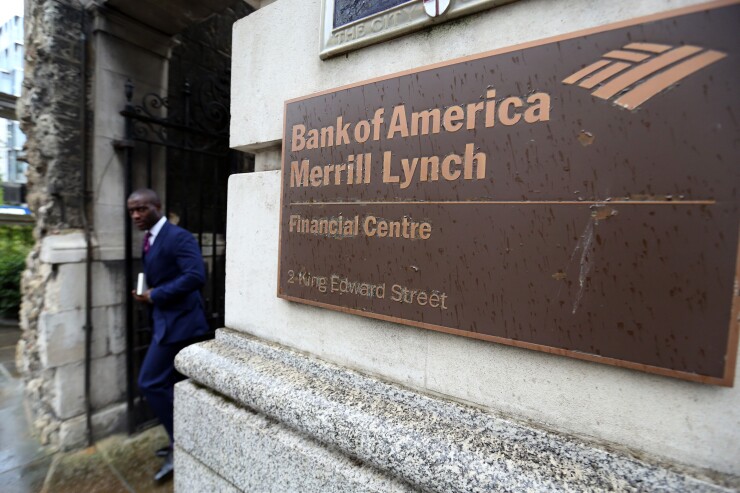An alleged failure to disclose conflicts of interest just cost Merrill Lynch $8.9 million.
That's how much the firm has agreed to pay in order to settle SEC charges that Merrill Lynch did not inform clients that there was a conflict of interest in how it selected investments for more than 1,500 retail accounts. Those accounts made investments totaling approximately $575 million in third-party products managed by a U.S. subsidiary of a foreign multinational bank. Meanwhile, Merrill also had a broader business arrangement with that bank.
"By failing to disclose its own business interests in deciding whether certain products should remain available to investment advisory clients, Merrill Lynch deprived its clients of unbiased financial advice," Marc Berger, director of the SEC’s New York Regional Office, said in a statement. "Retail clients must feel confident that their advisors are eliminating or disclosing such conflicts and fulfilling their fiduciary duties."
A Department of Labor rule adopted under the Biden administration had many brokers worried about their ability to work as independent contractors. A new proposal would roll it back.
The financial advisory firm initially sought an industrial loan charter back in 2020. It's the third company to receive the necessary approvals this year, joining General Motors and Ford.
Private equity in 401(k)s may face significant liquidity strains, reducing returns and complicating plan management, according to new Morningstar research.
"Here is a first. An external manager telling an internal product staffer what can go on an internal governance agenda," an internal Merrill Lynch email says.
Internal emails seen by the SEC provided an unusual insight into what products were available on Merrill's platform and how external pressures came to bear on Merrill Lynch's portfolio manager evaluation process.
In December 2012, a Merrill Lynch due diligence unit, part of the company's Global Wealth & Retirement Solutions business, recommended terminating certain products from its platform. Clients had already invested about $575 million dollars in those products, which were managed by a U.S. investment advisory subsidiary of a foreign bank, according to the SEC's order.
The SEC did not name the foreign bank or its U.S. subsidiary, nor did the regulator identify any of the executives involved in the matter.

Merrill's due diligence unit was prompted to review the products' performance following a change in the investment management team at the U.S. subsidiary of the foreign bank that oversaw the products.
A governance committee at Merrill Lynch was set to review the decision the following month, but before that meeting took place, the U.S. subsidiary of the foreign bank learned of the proposed termination and made an effort to head off the loss of business, which included a direct appeal to the broader business relationship between the two companies, according to the SEC.
During a phone call to a senior Merrill Lynch executive, one of the executives at the U.S. subsidiary of the foreign bank "stress[ed] the size and importance of the relationship, the thoughtful near year transition plan, the quality of the [new team] and extensive resourcing which drove [the transition] decision, and [their] commitment to the space," according to an internal email seen by the SEC.
On Jan. 15, a senior manager at Merrill Lynch called a manager at the U.S. subsidiary to say that while there would be additional due diligence on the products, none would be terminated even though Merrill's governance committee had yet to render a decision.
Later that day, an executive at the U.S. subsidiary emailed an update on the decision to a Merrill Lynch employee who managed the agenda of the firm's Governance Committee.
"As it stands now, this news is so new that it may be filtering through your organization, down to the key players in due diligence [and other areas, including the product group] but I wanted to inform you directly," the executive wrote in an email seen by the SEC.
The Merrill employee was apparently taken aback, forwarding the exchange to another Merrill colleague with the comment: "Here is a first. An external manager telling an internal product staffer what can go on an internal governance agenda."
When the governance committee did meet on Jan. 16, no vote was taken ― a break from Merrill's ordinary practices, according to the SEC.
The products were kept on hold until December 2013 when the investment management team "demonstrated to the satisfaction of due diligence that it had successfully managed the products," according to the SEC order.
Clients invested in these products on Merrill Lynch's platform paid a fee to Merrill that included identification of third-party investment managers, performance reporting, advice and guidance, the SEC says. Merrill earned about $4.03 million in fees, per the SEC.
In settling the matter with the regulator, Merrill Lynch will pay the penalty without admitting or denying the changes.
"We promptly enhanced our policies and procedures to ensure the confidentiality of recommendations in the future," a spokesman said in a statement.








